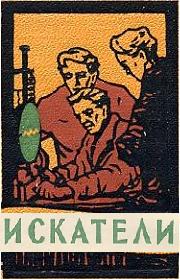
Center for Thaw Studies
presents a detailed summary of:
THOSE WHO SEEK
by
Daniil Granin
(1955)
CHAPTER ONE
A visitor enters a production laboratory for the city's Power Management System Board. He asks to see the head of the laboratory. She is temporarily away, so he waits.
As engineers puzzle over a faulty oscillograph, the visitor offers advice on its repair, which merely amuses the engineers.
The laboratory head, Maya Konstantinovna Ustinova returns. She beams with good news: the laboratory has won this month's red banner!
The visitor presents himself to Maya. He is Andrei Nikolayevich Lobanov, who has been newly appointed to replace Maya as the head of the laboratory. This shocks everyone. They all knew Maya had been appointed "temporarily", but that was a year ago and they had gotten use to her.
After a few awkward moments, Andrei arranges to return tomorrow to take over.
CHAPTER TWO
Andrei enters the technical department of the Power Supply Management Board, intending to introduce himself. There he meets an old friend from school, Viktor Potapenko, who is now head of the technical department. Viktor was the star student, for whom studying came easy. For Andrei, however, it was different:
"Andrei had a few favorite subjects, but he was interested only in the mysterious, contradictory sides of them....The unknown roused up in him a wild feeling of protest, of insatiable curiosity."
|
|
Nevertheless, at graduation, Odintsov chose Andrei for post-graduate studies. This offended Viktor's pride. Andrei, for his part, was a bit ashamed to be staying on for more study while his classmates were setting out for practical work. Viktor and Andrei cooled toward each other, and even begin sniping at one another.
Now, years later, Andrei and Viktor are both happy at this reunion, all their previous bitterness forgotten. Viktor invites Andrei home for dinner. Viktor is married to his old college sweetheart, Liza, and she's very happy to see Andrei again. Viktor and Liza have two young children.
Viktor proudly shows off the fancy amenities of his new apartment--new furniture, a refrigerator, the latest model television, and a bathroom with a shower. All this is nice, but the only thing Andrei envies is Viktor's bookcase full of technical books. Unfortunately, the books are not arranged by author or subject but by height (that is Liza's doing, Viktor explains). Among the many books is Professor Odintsov's latest work, but Viktor hasn't read it yet.
During dinner, Andrei recounts his war-time experiences: freezing in the trenches of Leningrad, storming Goering's castle. Liza listens with interest; Viktor is less attentive. (Viktor remained in the rear during the fighting.)
Viktor finally gets around to asking Andrei how he came to be appointed to the lab. Andrei says he asked for the job. Viktor doesn't believe it. After all, it's a step down from academic work. Andrei insists it's true. He has an idea for an "apparatus" he wants to develop and he thinks this lab is the perfect place to work on it. Viktor, scoffs, saying it's a production lab, not a research lab. Andrei will get bogged down on routine and administrative work and won't have time for his "apparatus".
Viktor goes on about how difficult it is to be a boss, but how wonderful is the feeling of importance and achievement that goes along with it. Andrei comments that Viktor is on the road to becoming a Minister. Viktor confidently concurs.
Liza tells Viktor that his old girlfriend, Rita, is in town and gives him her phone number.
When Andrei is leaving, Liza asks him to come around often. More than a polite request, it somehow seems like an urgent plea.
CHAPTER THREE
When Andrei was doing his graduate studies, Professor Odintsov was a hard task-master, forcing him to do everything by himself, both theoretical and practical work. The Professor would say, "It's no good having only the head of a scientist. You've got to have his hands as well."
Andrei's thesis work required much experimental work, more than could be done in the institute's lab. So, reluctantly, Odintsov approached the Power Management Supply Board with a proposal: in exchange for technical and laboratory assistance, the institute would create a device to locate breaks in electric cables (this was associated with Andrei's thesis). Odintsov concluded the contract, and soon Andrei was conducting his experiments. Andrei quickly realized, however, that the device the Power Management Board wanted was already outdated. Instead, he should be trying to invent a "leak locator" using principles of radar.
Andrei presented his conclusions to Odintsov. Although negotiating the contract had cost the Professor much in terms of his pride and reputation, he agreed with Andrei that the contract had to be terminated. After all, Odintsov said, "Honesty is every bit as essential in science as knowledge."
A certain Professor Tonkov, however, called in Andrei and told him that his ideas about the locator are all wrong. Existing methods could be improved. (Tonkov had even written an article on that subject.)
After graduation, Odintsov expected Andrei to stay on at the institute teaching. He was also offered a job working at the Academy of Sciences by Tonkov. But Andrei had become fixated on his leak locator and determined that the Power Management Board lab was the one place he could get this work done. The old professor was disappointed with this choice.
|
|
As he begins his reign over the lab, Andrei calls his engineers into his office one by one to test their knowledge. He is woefully disappointed for it seems they have forgotten all theory and are unable to solve even the simplest differential equations. To himself, Andrei dismisses then all as ignoramuses and dull-minded utilitarians.
Finally, Andrei has a talk with Borisov, the lab's Party secretary. Initially the two men form a dislike for each other and their methods. Andrei tells Borisov of his intention to dismiss all the engineers and hire new ones. He also expounds on his plans to design a leak locator. This project interests Borisov.
Borisov defends the current staff saying that they--like he--originally entered this laboratory treating it like a shining temple. The years of routine and unimaginative tasks have ground them down. But still, underneath their cynical exteriors, lies a genuine longing for real work, for new technologies, for the chance to make a difference.
CHAPTER FIVE
Andrei telephones Rita, and they agree to meet in the park. They last saw each other eight years ago, when Andrei was going off to the front. At that time, they had promised to remain true to each other.
Things happen, however. During the war, Rita married a Colonel and had a daughter with him. He was killed in action. Rita then married a second time to a man who could take care of her and her daughter.
As they meet in the park, Rita tells Andrei that she has wronged him and has come to let him vent his just anger on her. Instead, Andrei grabs Rita and kisses her. It is almost as if they had never parted.
After this, Rita and Andrei meet often in the park, even though it is difficult for Rita to get away from her family.
CHAPTER SIX
Maya, feeling her position awkward and untenable, turns in her resignation. Before accepting it, Andrei lets her know how badly she ran things, letting the lab plod along on petty routine and maintenance tasks, turning it into an obliging errand boy for others, forging no new ground, letting everyone loose their sense of initiative. The lab is as poorly stocked as a high school physics class. Maya is on the verge of tears, stung with this criticism.
Andrei soon learns that a lab is not just science. It is accounting, economics, personnel issues. So he spends days in the accounting office, the labor and wage department, and the planning department learning these new skills. He comes away with a new appreciation for the importance of these specialties. On his wall he hangs a sign reading: "Technical Development = Physics + Economics."
Andrei is so busy, he has no time to work on his locator. He tries saving every possible moment at work. The one time expenditure he refuses to reduce, however, is the time he spends with Rita.
CHAPTER SEVEN
Viktor, Liza and their children--Nadya and Vova--had grown into a model family. Everyone seemed to give them respect and envy, except for Andrei. In fact, Liza noted that with each of his visits a certain irritation and embarrassment grew within him. What's more, Liza noted the same feeling growing in herself.
Liza and Viktor had married right out of college. Those early days were difficult--living in a hostel, counting every kopeck. But Liza didn't mind...she was happy working for something larger than herself--her family.
When their children were born, Liza stopped teaching. As they got older, she considered going back to work, but Viktor was not enthusiastic about the idea.
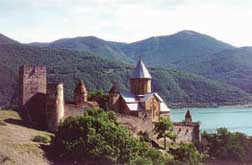 Georgian Military Highway |
One summer, they took a trip along the scenic Georgian Military Highway. Viktor wanted to go home early to work on a "synchronizer" he was developing, but Liza persuaded him to stay on among the rivers, mountains and old castles.
Back on the job, Viktor was made assistant director, then director of the technical department. He took a liking to administrative work. He enjoyed managing people, pushing, demanding, arranging things. New friends surrounded them, always praising Viktor's abilities. There were vague rumors that Viktor could not bear to have competent people in his department and that he surrounded himself with flatters--but Liza dismissed this as malicious gossip.
They had a wide circle of useful acquaintances. Theatre tickets or items in shops that were not generally available were easily obtained for them.
Viktor forgot his work on the synchronizer. After trips to Moscow, he talked admiringly about work in the Ministry, and he began thinking about how to get there himself. These appointments don't come by chance, he said and continued, "Chance aids those who know what they seek."
One day, Anna Pavlovna, the wife of another administrative worker in the department, let drop a rumor about Viktor and a the Chief Engineer's secretary, Nina Tsvetkova. Liza knew that it wasn't true. But then she realized that if it had been necessary for the sake of his career, Viktor would have made love to Nina without a moment's hesitation. He had become calculatingly selfish.
Liza looks at a pile of Electricity magazines lying on Viktor's desk, their wrappers untouched. Liza quickly tears open the wrappers, thinking, what if Andrei were to come and see this?
CHAPTER EIGHT
A consignment of recorders comes into the lab for repairs, as had been done many, many times before. Andrei refuses the job and goes to see the Dmitri Alekseevich, the chief engineer. Dmitri demands to know why Andrei isn't repairing instruments as required. Andrei pulls out the laboratory's plan, which was approved by Dmitri himself. Nowhere in the plan does it mention repair work.
Andrei then launches into his plans for improving the lab, which will require new equipment and personnel...in short, more money. In addition, Andrei has discovered that equipment, funds, and personnel budgeted for the lab were actually sent elsewhere. This includes Dmitri's own secretary--Nina Tsvetkova, who's supposed to be a junior lab assistant. The Chief Engineer laughs. Nevertheless, Andrei wins his point on the question of repairs.
CHAPTER NINE
One of Rita's friends leaves town for a while, leaving the keys to the apartment with Rita. Now, instead of walking the streets, Andrei and Rita can come here for their rendezvous. Andrei loves these moments. Their kisses are sweeter. But he becomes envious when he remembers that in just a few hours, Rita will be doing these same things with another man--her husband.
Andrei asks Rita to marry him. She says she'll think about it. This delay causes Andrei pain:
|
|
CHAPTER TEN
Andrei's refusal to do repair work earned him an enemy--Viktor's assistant, Kiriil Vasilevich Dolgin, a bureaucrat and demagogue. Dolgin dealt with the station managers, and he used the lab's repair work as a way of bargaining with them--in short, it was one of his sources of power.
The Komsomol Power Station reports that it is having trouble with one of its generators. Dolgin, who is helpless in technical matters, consults with his unofficial technical advisers, one of whom suggests the problem is with the armature winding. On the basis of this, Dolgin suggests that the generator be taken off line for repair. Unexpectedly, Dmitri asks the lab to check the generator. One of Andrei's engineers, Krivitsky, goes out to the station and returns saying that while he doesn't know exactly what the problem is, the winding has nothing to do with it.
The next day, Krivitsky and Andrei return to the power station and review the problem with the station's duty mechanic, Boris Zinovyevich. Boris says he thinks the problem is with the exciter circuit. Andrei happily realizes that the mechanic is right.
Viktor also happens to be at the station on another matter. Andrei marvels at Viktor's ease in dealing with people.
Andrei tells Viktor about the generator. Viktor dampens Andrei's enthusiasm by telling him that his job is merely to write a report. If Andrei guarantees that the generator is fine, the responsibility will be Andrei's. That safest course, says Viktor, is for Andrei to make a report recommending that the generator be taken off line for testing.
Andrei writes his report, making derogatory mention of Dolgin's theory about the windings. Krivitsky advises Andrei to remove that reference, but Andrei insists on keeping it, saying it is the truth. Krivitsky predicts that Dolgin will declare war on the lab.
Dmitri reassigns his secretary--Nina Tsvetkova--to the lab, where she really belongs, according to the plan. She presents herself to Andrei in a fancy dress and coiffure. She says she'd prefer to be a secretary, but Andrei insists that since she's officially a junior lab assistant, that is what she will work as. He tells Maya to find her something interesting and arduous to work on, and also to suggest that the lab is not a place for fashion displays.
CHAPTER ELEVEN
The generator at the Komsomol Station is switched to the reserve exciter and works just fine. Thus, thanks to the work of the laboratory, the generator was not stopped for repair. Dolgin is not happy, and tries to tell Viktor that Andrei is a backbiter out to undermine his authority. Viktor is unconcerned and says that, anyway, it is Dolgin who is in charge of the laboratory. Dolgin asserts he feels awkward, because Andrei and Viktor are friends. Viktor responds, "Where work is concerned, I have no friends."
Andrei also offends Ivin, the assistant manager, by refusing to repair his radio. He shocks Viktor by saying that if Viktor needed a radio repaired he would gladly do it himself, but would refuse to let it be done by the lab. Viktor advises Andrei to stop making waves.
CHAPTER TWELVE
Andrei gets demanding with Rita, saying that she must end the falsity by divorcing her husband and marrying him, Andrei.
Rita says the choice is easy for Andrei because he's single. But--good or bad--she has a family. She recalls when her first "husband" died at the front. They weren't officially married, so she didn't get a pension. Also, the apartment wasn't in her name, so she and her daughter were kicked out onto the streets.
Rita may not love her husband, but she is good to her and her daughter, taking care of them well. What's more, her daughter knows him as her father and is happy. Her husband and daughter have done nothing wrong, and a divorce would only hurt them.
|
|
CHAPTER THIRTEEN
The changes going on in the laboratory broke people up into various factions. The anti-Andrei camp was led by Lonya Morozov, a young dandy of an engineer. Morozov had a considerable influence on the younger people in the lab, because of his easy manner, drinking parties, and fancy clothes, including jackets with zip-fasteners. Morozov was particularly against the refusal of repair work, because it used to bring extra money into their pockets.
In an attempt to shore up support for Andrei, Borisov calls a meeting of the Komsomol to discuss Morozov's influence. The younger workers agree that Morozov has some backwards traits--an insulting attitude to women, showing up to work drunk, telling others that further technical study was a waste of time. But, they say he's still a good engineer...and they agree with him on the point of losing money over the repair issue.
Borisov tries to convey the idea that the transformation of the lab to useful, interesting work is a struggle against conservatives and stick-in-the-muds.
|
by Arkady Gaidar:  The Tale of the Military Secret In which a little boy keeps a big secret and saves the Soviet Motherland |
Borisov asks Andrei if he has read Arkady Gaidar's Blue Cap. Andrei doesn't see the relevance, so Borisov explains:
"A man and his little daughter set off on a journey, and the whole journey took them only about two or three hundred paces from their summer cottage. But on the way there were strange encounters, adventures, battles, marvels. It was just as if they had come into a foreign land. They had managed to see the world through different eyes."The important thing, as Borisov sees it, is to get everyone carried away by a common idea:
"If only he could show them what beauty there was in routine work in a laboratory, how much imagination, strength, will-power it demanded, what opportunities it offered. To become a creator you didn't necessarily have to be an engineer. You could remain an ordinary laboratory assistant, or fitter, and yet still feel yourself a soldier of that great army in which Faraday, Yablochkov, Krizhizhanovsky had fought. Couldn't he inspire the lads with a desire for a discovery? Couldn't he make them feel that their vocation was here, in the laboratory?"
|
--V.I. Lenin 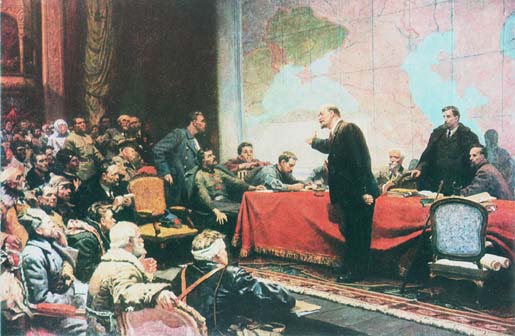 Read: Lenin and the GOELRO and Stalin's Letter to Lenin about the GOELRO |
Andrei waxes poetic about the many pioneers who accepted the challenge of the future, such as engineer Aleksandrov, who was laughed at when he proposed a Dneiper Dam; but in 1927 construction of this grand dam was begun. Andrei wanted to show the opportunities for heroism in scientific work. Every age had its own spirit of romance. The job was to discover it in everyday life. Maybe it would smell of sweat instead of gunpowder; but still it would be heroic and future generations would envy their lot.
Andrei recounts how he first got the idea for the locator. It was during the war. A communications line was broken, and two of his comrades gave their lives trying to find the break. If a locator had existed, their lives would not have been wasted. Andrei goes on to describe how important the locator will be in contemporary life, affecting not only army communications but telegraphy, electric railroads as well as high-voltage lines and underground cables that extend for hundreds of miles under cities, through forests and ravines.
They meeting breaks up, everyone inspired...except for Nina Tsvetkova, who's main impression--mistaken though it is--is that Andrei is attracted to her.
CHAPTER FOURTEEN
At the Oktyabrskaya Station, Andrei meets assistant shop superintendent Rheingold, a shy engineer who, it turns out, has been working on developing an automatic synchronizer for simplifying the complicated process of switching on a generator. Rheingold is reluctant to talk about the device, but Andrei insists, so Rheingold invites him over to his apartment to look at it.
Andrei is much impressed with Rheingold's work and asks why the management isn't helping him with it. As it turns out, they did help with the first model, which tested quite successfully, but then Viktor himself cut off funding until Rheingold could produce a finished model for further testing. Andrei is outraged. Why didn't Rheingold protest? He did protest, and he got demoted as a result. Hints were even dropped that he would lose his apartment if he continued to make trouble. Andrei vows to help Rheingold perfect the device in the lab.
Andrei travels to all the power stations, exploring, poking, prodding, questioning, learning everything he can about where his locator might someday be used. At the Proletarskaya Station he meets the duty engineer Krasnopevtsev, who, it turns out, has made an innovative modification to the standard pressure regulator. Andrei is excited and wants Krasnopevtsev to work out a whole new design for the regulator. Krasnopevtsev is uninterested in the task. Andrei tries to insist, but the plant director, Kalmykov bombards him with a speech, saying they don't need any fancy-schmancy contraptions. What they need is a way to lessen the grueling work of the stokers, et al.
Andrei gets Rheingold transferred to the lab, and soon the synchronizer is done. All that is required now is to test it at a hydro-power station. Dolgin, however, says that the work on the synchronizer was not in the lab's plan. Andrei counters that it will be included in the new lab programme which is being worked out.
Dolgin offers a bargain: he will approve the test party if the lab agrees to take on repair work again. Andrei refuses. So Dolgin refuses to authorize the test party, saying, "The basis of our activity is the plan. Violation of the plan is a crime against state discipline. The plan is a law." Andrei responds, "Yes, but not the most important one."
Andrei sends the test party out anyway, on his own authority. He is then summoned to Viktor's office. Viktor shows him a memo prepared by Dolgin for Viktor's signature. It reports a sharp deterioration in the work of the lab. Junior personnel are left to their own devices, and engineers have been seen reading books during working hours! (The fact that they are technical books isn't mentioned in the report.) Labor discipline has broken down, as shown by the increased number of reprimands and penalties. (For example, Morozov was reprimanded for being late--the Komsomol members themselves had demanded this). Unnecessary apparatus had been bought. The Rheingold synchronizer had been made illegally. A test party had been sent out without permission. The head of the laboratory could rarely be found in the laboratory and had no capacity whatever for leadership. In short, the memo calls for Andrei's dismissal.
Viktor lets Andrei read the memo, then takes it back and rips it up. Viktor promises that he himself will approve the test party.
Viktor then suggests that the technical council will not confirm Andrei's plan for the lab. He suggests that they take the locator out of Andrei's plan and put it into Viktor's plan; that way, it is sure to get approved. Andrei considers this, but rejects the offer, saying he intends to fight for his plan.
That evening, Viktor calls on Professor Tonkov, then on Maya, who's alone in her apartment. (Her husband is a sailor away at sea). Viktor proposes that Maya--under Tonkov's supervision--take on the job of perfecting the existing method of leak location. He says that she got a raw deal at the lab and that this will be a way to put Andrei's nose out of joint.
Maya is reluctant, asking why Viktor is doing this, since Andrei is his friend. Playing a role, Viktor acts as if he is making a difficult confession and says, "I have always longed to be able to do something for you." Maya blushes. Viktor, still play-acting, says, "So you see, Maya, always seek the personal motive in everything."
CHAPTER FIFTEEN
After secondary school, Nina tried to get into the Institute of Technology, but she didn't pass the test. She took a job as a secretary and soon discovered that here it didn't matter that she was good at math. All that mattered was that she was pretty and could flirt. However, none of the serious, worthwhile men she met outside of work were impressed by her status as secretary. But now that she's a "lab assistant", that has changed. She has also changed her dress and hair, keeping it simpler, like Maya's.
Andrei's speech to the Komsomol made a strong impression on her. Suddenly, her own life seemed dull, useless. She went to see Andrei and said she wanted to go study at the institute. Andrei, however, dismissed the idea. He tells her that she is merely running away from difficulties in the lab. There will also be difficulties at the institute, and what will she do then? Run away again? Andrei says Nina should wait until she can no longer live without the institute, until she sees it in her dreams. Then, he says, he will happily approve.
Rheingold, Borisov, Nina, and another engineer named Sasha Zaslavsky are sent to a hydro-power station in the forest to test the synchronizer. Nina enjoys the woods. She remembers her walks in the woods with her father, a forest warder. Sasha, who seems to be attracted to her, takes Nina out for a boat ride on the lake. Nina enjoys teasing Sasha by making negative comments about Andrei then listening to Sasha's impassioned defense of their boss.
Viktor shows up to monitor the test. When he sees Nina, he merely waves from afar--a very different reception than that she was used to when she was a secretary. When Nina was secretary, Viktor never missed a chance to flirt with her, give her gifts of perfume, etc.
The work at the station was the first interesting job Nina had done in her life. When the synchronizer succeeds, she is on the verge of tears. Fine speeches are made all around. Then a dispute breaks out. Rheingold and Borisov want to take the synchronizer back to the lab for further experimentation. The station director and Viktor, however, say that the synchronizer is to stay put here in and do the work for which it was designed. Borisov tells Nina to hurry back to town and tell Andrei what has happened so he can telegram them with instructions.
|
to another. 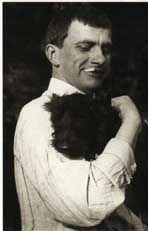 Vladimir Mayakovsky at RussianPoetry.net Texts, sounds files, and more. |
Nina goes to Andrei's home. He is living with his father, his sister, Katya, and his sister's daughter, Tanya. Andrei is not at home, but Katya lets her wait in Andrei's room. A photograph of Mayakovsky with a dog in his arms is hanging on the wall. "I'll buy a book by Mayakovsky today," Nina thinks.
Andrei's father returns home and tells Nina that Andrei is at the library
Andrei had been at the library all morning, going through American technical magazines. He couldn't help but notice the articles about the hydrogen bomb and the advertisements of the Bell Telephone Company, proudly calling itself the leader in the production of atomic weapons. And this from a company founded by a man who wanted to create devices to aid the deaf. An appalling shame.
Nina shows up at the library and tells Andrei what has happened. He is infuriated, but doesn't know what to do. Nina asks if the chief accountant can help. Andrei calls Nina a genius!
Andrei telephones the chief accountant and tells him the story, saying that now they will have to build another synchronizer at four times the price. The accountant is outraged and says he'll order the synchronizer returned.
To celebrate, Andrei suggests that he and Nina go to the movies. In the darkened theater, Nina, now looking at Andrei with admiring eyes, wishes deep in her soul that Andrei would hold her hand.
CHAPTER SIXTEEN
Shortly before the technical council is to meet, Viktor fixes it so that a couple of Andrei's allies will be absent. Also, Tonkov shows up as a special guest.
Viktor proposes his new plan for the lab, which envisions no scientific research. According to this proposal, the new lab's primary task is to cater to the essential needs of the production branches and to improve elementary aspects of production...such as developing electric heaters for workers who are outside working on main lines.
Andrei denounces the proposal passionately, saying they have a strong research group and that using it for electric heaters is like swatting flies with a steamroller.
Andrei puts forth his own plan which includes the perfecting of Rheingold's synchronizer, the introduction of automation for boilers, and, of course, the locator. Andrei wants to combat the backwardness in their work. The efforts of some electricians, while noble, remind Andrei of an old scribe with a quill pen while there are typists banging all around him.
Unexpectedly, some members of the council speak in support of Andrei. Naumov, an electrician, agrees that a locator is more important than electric heaters. A high-voltage engineer likes the idea of having creative engineers roaming around identifying problems and working to solve them.
Sensing that momentum was starting to move in Andrei's direction, Viktor unleashes Dolgin, who launches into a vitriolic personal tirade against Andrei. Dolgin accuses Andrei of having come to the lab out of personal motives...the desire to develop a locator, write a thesis on it and become famous. Dmitri cuts off Dolgin, saying they are here to discuss the plan, not Andrei's conduct.
Dolgin calls on Tonkov to speak. Tonkov, while believing that Andrei's motives are only the best, says Andrei's idea for the locator is doomed to failure. He suggests that the current method should be perfected, and to this end, he proposes to work in cooperation with the lab.
Andrei says it's useless to patch up the old apparatus, which should be tossed on the scrapheap.
Viktor, making his evil plan apparent, says that Maya has already agreed to work with Tonkov on his device. The decisive factor is Tonkov's statue, so Viktor's proposal is accepted by a vote of 15-4. Every item put forth by Andrei and the lab is rejected.
Andrei is on the verge of resigning, but realizes that that is exactly what Viktor is hoping for. So, instead, he submits, saying, "Some people may think that I'm wrong. But I shall be wrong only if I fail to achieve what I have set out to do."
After the meeting, Viktor, tells Andrei that despite quarrels at work, they should always be friends outside. Andrei rejects the notion, saying, "If we're at odds in our work, we'll be at odds everywhere."
CHAPTER SEVENTEEN
Feeling depressed after the meeting, Andrei goes to his office. Faleev, the Party organizer from the institute, calls, all bright and cheerful. He asks how Andrei's been getting on, then mentions that there's a teaching position available at the institute. Andrei doesn't respond. Faleev also says an American delegation is coming to the institute, and he wants Andrei to join them, since Andrei speaks some English.
 Just say NYET to vodka (circa 1954) |
Later, Andrei wanders around aimlessly. He plops down in a restaurant and a waiter brings him vodka and beer. Sitting next to Andrei is a disgruntled looking fellow who is trying his best to get drunk. However, the fellow notes, it's not so easy to get drunk when you're miserable. He complains of his boss, a Stalin Prize winner who's always stealing his work and taking the credit for it. The fellow doesn't complain because he's got a wife and family and doesn't want to risk his position. If he were dying of cancer, the fellow claims he'd get up and denounce his robbing swine of a boss.
Andrei denounces the fellow as a slug, a crawler. That may be true, the fellow admits, but says there are lots of people like him. Andrei angrily spits back:
"You're lying. There are more of us. If there were many of you, you'd have nowhere to hide. You hide behind the backs of the real people. You're deserters. You're repulsive even to yourselves. I'd rather deal with your chief than with you. At least I'd get some pleasure out of punching him in the jaw."Andrei heads home. He tells his father, Nikolai Pavlovich, what happened at the meeting and says he'll have to quit and go get a job at an institute somewhere. Nikolai is disgusted at Andrei's lack of resilience, at the fact that he's surrendering already. Nikolai snarls:
|
|
The next day at work, Andrei tells the lab staff what happened at the meeting. Most are disappointed that they won't get more interesting work after all.
Viktor arranges a big media event for the signing of Tonkov's agreement with the lab. Andrei refuses to take part in the circus and, instead, goes with Faleev to show the American delegation around the institute. The Americans are surprised to find out that the portrait of Benjamin Franklin hanging on the wall is not just temporary window dressing, but that the students there are well versed in his work (including the fact that Franklin championed the cause of the Negroes).
Later, knowing that Faleev is working on automation, Andrei suggests that Faleev see what he can do for Krasnopevtsev at the Proletarskaya Station.
CHAPTER EIGHTEEN
Liza goes to a reunion of her Teacher College. She happily greets her former friends and classmates, including Zhenya Samoilov, who used to be sweet on her.
Liza's group gathers in their old lecture room. Everyone starts describing what they are up to currently--one's a book editor, another is working at the Lomonosov Museum studying his poems on science. Liza is suddenly self-conscious about her lack of career. She sneaks out of the room before it is her turn to speak.
Liza dances with an old professor, who reacts sadly when she tells him that she is no longer working. He opines:
"Yes, it's like that. You read your students' essays, mark examinations papers. I could write a book in the time I spend on one student. May you never know such feelings--it hurts to give so much of yourself to another and then find out that he never needed it at all. A sheer waste. Like a bricklayer building a house for no one to live in."Ashamed, Liza leaves the reunion.
CHAPTER NINETEEN
The hubbub over the mutual-help agreement with Tonkov does not die down. Reporters keep showing up, and even Andrei is forced to make general statements about the advantages of cooperation between scientists and production workers.
Sasha keeps pestering Andrei, wanting to know why Tonkov is against the locator. Andrei finally replies, saying, "Tonkov is working out the theory of the bow and arrow. But you and I are designing a quick-firing gun. What's the use of his theory?"
Andrei brings Faleev and Krashnopevtsev together to work on automating work in the boiler room. Both are keen to take on the task.
Andrei leaves work every day at exactly six o'clock so he can go home or to the library to work on the theory of his locator. He becomes a hermit, shunning all human contact. There is a photo of Rita on his desk at home, and he constantly looks at it sadly, unable to let her go.
One day, Nina asks Andrei to go to a football match with her. Andrei dearly wants to go and relax, have fun, cheer for Dynamo, but he regretfully declines the offer, saying he "must" work. Nina frowns and leaves without a word.
One morning at work there is a great commotion around the wall newspaper. They have published a satirical poem aimed at Andrei. In the poem, he is portrayed as a learned cat, equipped with books, equations and measuring tools who, nonetheless, fails to ever catch a real mouse.
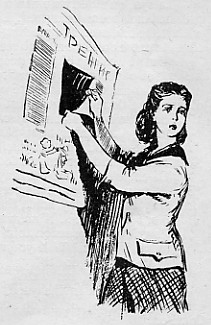 Nina is furious at the poem. When no one is looking, she takes a razor blade and cuts it out of the paper. This "crime" causes a fresh hubbub, although Nina's role as perpetrator is not discovered. However stupid her action, Nina feels that it proves that she loves Andrei and will do anything for him.
Nina is furious at the poem. When no one is looking, she takes a razor blade and cuts it out of the paper. This "crime" causes a fresh hubbub, although Nina's role as perpetrator is not discovered. However stupid her action, Nina feels that it proves that she loves Andrei and will do anything for him.Strange to say, Andrei does not feel crushed by this fresh attack in the newspaper. On the contrary, it somehow shakes him up. He remembers the technical dictum, "A tungsten contact must be toughened in order to resist flattening." He wants to be like a sword on the anvil--the more it is beaten, the sharper it becomes.
Eventually, Andrei finishes his theoretical calculations, and they prove that the locator can be constructed as he had planned. He writes a short article on it and submits it to the technical department's periodical. It is rejected. "Not topical," says Dolgin.
Andrei sends the article to the journal Electricity, but it is quickly returned with an annihilating comment from Tonkov. Two more journals reject it as well.
Borisov tries to comfort Andrei, saying that this attempt to silence Andrei merely proves that he is right.
CHAPTER TWENTY
Andrei is called into Dmitri's office, where he and Viktor are having a meeting with a colonel and a major of naval engineering. The officers have come to ask the Power Supply Management Board to design a locator for the complex electrical system of a new class of ships. Such a locator would enable them to simplify considerably the electrical system on ships.
Viktor and Dmitri are trying to dissuade the officers, saying that they should look instead into the work of Maya and Tonkov. The officers are completely uninterested in the old method.
Dmitri turns to Andrei, expecting him to confirm what they have already told the officers--that the locator is only a general idea on which nothing has been definitely worked out. To his surprise, however, Andrei says that he has proven the viability of the locator theoretically, and the Board should accept the project. Upset, Dmitri points out that no actual experimental work has been done on it, so there is no guarantee of success. The naval colonel offers to provide facilities for experiments if necessary. Viktor cuts the meeting short, telling the officers they will discuss the matter and inform them of their decision shortly.
When the officers leave, Viktor jumps up and angrily says this is all the result of a conspiracy of self-advertisement Andrei has undertaken. Viktor produces a copy of the journal Youth and Engineering, which has a short article on the locator. Andrei has never the article before and is mystified as to how it appeared.
Viktor also lets drop that other people have been calling for information on the locator. Andrei takes this as proof that the locator is needed.
Dmitri takes Andrei's calculations home to study and review. He is predisposed to dismiss the idea as a crackpot notion. But as he reads the paper, he gets more and more interested and intrigued with the idea. At the end, he is convinced that experimentation on the locator should go forward. Dmitri gets excited as he imagines uses for the locator that even Andrei hasn't foreseen.
CHAPTER TWENTY-ONE
The laboratory staff are planning an outing. The consensus is that they shouldn't invited Andrei. While they respect him, he isn't very sociable or friendly. Borisov says that's nonsense and insists that they invite Andrei. But Borisov does admit to himself that Andrei seems to have become very one-dimensional, dedicated only to work. Borisov decides that as Party secretary, it is his responsibility to help Andrei become a more rounded person.
Over the past months, Borisov has come to enjoy his Party work more and more. He has clashed with Dolgin more than once. The first time was when Borisov decided to get serious about discipline and reprimand Morozov for coming to work drunk. Dolgin said it shows that discipline has been declining. (In fact, it shows the opposite, that they are finally getting serious about discipline.) Borisov also saw that the pledges made as part of the socialist emulation campaign had turned into nothing but empty promises to do nothing in particular. It was decided that from now on only those who were willing and able to finish their work ahead of schedule should give these pledges. The effectiveness and vigor of the pledges was thereby increased--but their number decreased, and this is what Dolgin took note of, characterizing it as another laxity in political work. Borisov angrily denounced Dolgin as a bureaucrat interested only in nice-sounding reports.
CHAPTER TWENTY-TWO
The laboratory staff outing begins with an all-night cruise on a steamer. Andrei stays aloof from the staff, meaning to make some notes on the week's work. However, he finds himself entranced by the sea. He stands by the railing, happily taking in the sights and the smells.
Nina invites Andrei to dance, and for the first time, he takes note of her as a woman, gazing at her legs and breasts.
Sitting down for something to eat, Andrei awkwardly tries to make conversation with a staffer. He commits a faux pas, asking the man about his wife--Andrei was unaware of the fact that the man and his wife separated ten years ago.
Borisov tells Andrei that Sasha has requested his personal vacation days be transferred to next mouth. It seems that Sasha, still sweet on Nina, is intending to invite her to go on a trip together. Andrei is surprised to hear about Sasha's romantic intentions. Borisov makes Andrei realize that he (Andrei) knows absolutely nothing about the personal lives of his staff.
At midnight, a talent show begins. Novikov tells jokes, Voronko sings a Ukrainian song, Vanyuskin does magic tricks, and Nina dances a Hungarian dance. Sonya Manzula--a staffer with whom Andrei has never even spoken--surprises Andrei with a moving recitation of Chekhov's story The Joke. Only then does it sink in for Andrei that all these people have complex, multi-faceted lives and that for them the lab is only one part of it.
CHAPTER TWENTY-THREE
In the morning, the boat docks at the Green Pier. Andrei gradually becomes more at ease with the others, and even gets involved in a swimming contest.
Andrei takes a nap, then is awakened by Nina, who leads him off for a walk into the forest, away from the others. They chance upon some women who are mowing grass with scythes. Nina takes a scythe and mows expertly. She tells Andrei she learned the skill growing up in the forest.
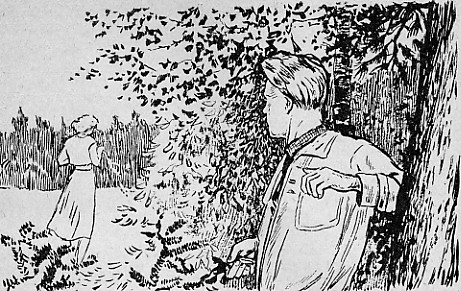
To demonstrate her forest skill, Nina closes her eyes and has Andrei lead her up to various trees. She correctly identifies each tree by feeling the trunk and smelling the leaves.
Andrei feels happy, as if drunk. He tells Nina that she is lovely. She kisses him, and he embraces her. Immediately, however, Andrei regrets it, telling himself that this is not love. He tells Nina that he likes her, but.... He points out that Sasha really loves her. Nina scoffs saying that she could never love Sasha. Further, she says that Andrei is afraid of his own feelings and that he knows very little about people.
CHAPTER TWENTY-FOUR
Sasha goes around looking for Nina. Morozov, his breath stinking of vodka, taunts Sasha by casting aspersions on Nina's honor and implying that she is having an affair with Andrei. Sasha and Morozov almost come to blows, but they are separated.
Sasha goes wandering off by himself and it dawns on him that Nina does in fact love Andrei. He then comes upon Andrei and Nina just as they are finishing their conversation from the previous chapter. Nina is angry and shoves Sasha away. Sasha assumes that Andrei did something to offend Nina.
Hoping to cut off any chance of every returning to the laboratory, Nina marches up to Borisov and announces that it was she who cut the anti-Andrei poem out of the wall newspaper. She even tells him the whole story of herself and Andrei. Instead of being cross, Borisov looks at Nina with new-found respect. He says it is Andrei who should be reprimanded for not falling in love with her.
That evening, everyone is on the boat heading back to town. Borisov is pleased to note that the estrangement between Andrei and the staff has melted away.
Petya Zaitsev provokes an argument:
|
|
Andrei and the others calculate that in 50 years a person can read only 3,000 books (50 pages a day; average book length 300 pages):
|
|
Vera Sorokina bemoans the fact that Soviet authors write so little about love. Vanyushkin, head of the Komsomol, says that unhappy love isn't so common these days. There are some lady-killers, etc., but they will die out as we get nearer to Communism.
The group then takes up the question: Will there be unhappy people under Communism? Sonya Manzhula thinks that "happiness will become a duty, like work."
Throughout the conversation, Sasha truculently tries to pick a fight with Andrei. He asks Andrei a loaded question: If Andrei were dating a girl and some other man got in the way, would Andrei punch the other fellow and forget the girl or what? Andrei demurs on the question of the punch, but says that the lover should not give up on the girl--if he truly loves her, he should keep fighting for her and not give up hope. Suddenly realizing the truth of what happened between Andrei and Nina, Sash feels joyful gratitude toward Andrei.
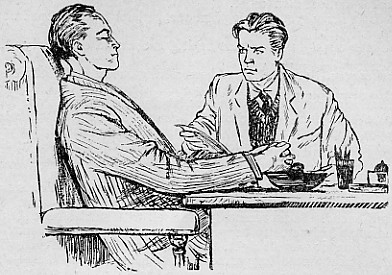 CHAPTER TWENTY-FIVE
CHAPTER TWENTY-FIVEAndrei goes to consult a famous professor, Matvei Semyonovich Grigoriev about some problems with the locator.
Grigoriev berates Andrei for not expressing himself simply enough. He tosses Andrei out of his office and tells him to return when he's gotten his mind clear.
Andrei dismisses Grigoriev as a conceited ass, and is surprised when Grigoriev calls him a few days later and invites him to his dacha.
On his way to the dacha, Andrei is intercepted by a boy, who leads him down to a beach. Grigoriev is there. The two men discuss the problems with the locator, and Grigoriev excites Andrei with his insightful analysis. It turns out that the locator, when successfully completed, will be of help to Grigoriev in some work he is doing on the electric arc.
Grigoriev confesses to Andrei that he must spend much time on some pointless work with Tonkov.
Grigoriev then tells Andrei to meet him at the dacha later. He also asks that Andrei tell no one about the meeting on the beach--the doctors tell Grigoriev that he shouldn't go swimming, so he has to keep it secret.
CHAPTER TWENTY-SIX
A short while later, Andrei arrives at Grigoriev's dacha. Numerous scientists have arrived to play cards and socialize. Most of them are quiet talented, including Pudanov, a Stalin Prize winner. The fame and fortune which came with the prize, afforded Pudanov the opportunity to devote more time to his passion--raising asters--and less time to science.
Tonkov is also there. Andrei expects Grigoriev and the other scientists to treat Tonkov dismissively; instead, they are polite to him.
Among the guests is Kunin, a name linked with the founders of Russian physics--Lebedev, Lazarev, and Timiyazev.
Kunin's most recent article--which Andrei found intriguing and refreshing--had been accused of idealism and empiricism. It was an attempt to overthrow many hoary concepts and create a unified theory.
Passing by, Tonkov tells Grigoriev's wife, Ziniaida, that Kunin has compromised himself and that Grigoriev should be careful about associating with him.
Andrei says, "Kunin's mistakes are worth more than a lot of other people's achievements."
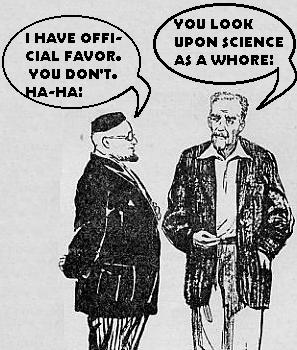
Tonkov goes up to Kunin and, hinting at Kunin's position of disfavor, offers him a research job and help with getting equipment for his lab. Kunin refuses the offer. Then, pointedly, Kunin recalls a story from his university days when he was working with X-rays with the famed Lebedev. A boorish, drunken merchant barged into the lab, demanding "photo of his insides", offering to pay big money for them. Lebedev angrily kicked him out of the lab. Others in the lad suggested that they could have used the money for equipment, etc., but Lebebev responded, "My dear sir, do you look upon science as a whore?"
Grigoriev enters into a conversation about Andrei's locator with Tonkov. Grigoriev suggests that Tonkov's method may soon be out of date. Tonkov dismisses Andrei's idea as the madness of youth.
During discussion at dinner, Tonkov proclaims that the value of a scientific work is reduced if the author tries to popularize it or explain it simply. Tonkov is supported by a young expert in condensers, Smorodin, an obvious suck-up. Andrei is supported by Anechka, another young electrical expert who also happens to be Grigoriev's niece.
Tonkov continues, saying that oversimplification arises from vanity, a desire to be acknowledged by the crowd. In support of his position, he notes, "Did it matter to Hegel that he was read by probably not more than a thousand of his contemporaries and understood by about twenty of them?"
Grigoriev shyly counters: "But Dialectics of Nature, you know, by Engles, gave people no less than all Hegel's ten volumes. And it's quite readable."
Later, Tonkov pokes fun at Andrei's dedication to the locator, saying:
"You are simply wasting your gifts on this fanciful apparatus of yours. Let us suppose that, having spent several years and a mass of nervous energy on the job, you achieve your object. Then what happens? A year passes and some engineer or other improves your apparatus. Another year passes and something else in it is changed and very soon the Lobanov apparatus ceases to exist and instead it is Sidorov's, Petrov's, and so on. And no one remembers Lobanov, all your work is forgotten. Alas! That is the regrettable difference between practical engineers and scientists."Andrei responds:
"As for my eternal fame, you're wasting your time worrying about that. There is something more brilliant and more fruitful than any individual scientist, and that is science itself, that irresistible process that is carried on day by day by thousands of rank-and-file scientific workers. I have realized that in my work on the locator. If the locator is ever created, it will be created not by me, but by the laboratory as a whole. The time of the lone individual is coming to an end. Especially in science. All the biggest problems are solved by teams. And in any case, the idea of contrasting science and engineering is, as I see it, utterly ridiculous and harmful. One thing cannot develop without the other."Earlier, Grigoriev had advised Andrei to consult with Smorodin on the matter of condensers. After dinner, Andrei tells Smorodin what he needs. Smorodin's first question is about how he will get paid. This avaricious attitude upsets Andrei, who says, "If you regard your knowledge merely as a source of income.... Is that a feature of Tonkov's school?"
Andrei leaves. Smorodin tells Tonkov of his conversation with Andrei. Tonkov calls Smorodin and idiot and tells him to call Andrei tomorrow promising to work with him for no payment.
Tonkov then affectionately reproaches Grigoriev for getting involved with Andrei's scheme. He suggests that Andrei is an adventurer and warns that it might all be a trap. Grigoriev's wife and mother-in-law agree with Tonkov. Grigoriev has faith in Andrei, yet he recalls that Tonkov and the others have often proven to be wiser than he in everyday matters.
CHAPTER TWENTY-SEVEN
Walking to the station, Andrei gets lost, falls, and hurts his leg. He stumbles upon what appear to be two quarreling lovers. The woman--Marina--angrily leaves her boyfriend, and Andrei ends up accompanying her back to town on the train.
CHAPTER TWENTY-EIGHT
Because of his injured leg, Andrei has to stay at home for several days. He finds himself thinking about Marina. He also takes note of how Katya has to do all the shopping, cooking, and cleaning in addition to her full-time job. This gives him a new understanding of the female workers at the lab, who never want to stay late at work.
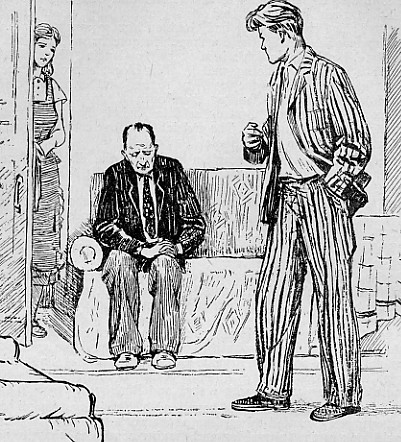 Rheingold calls on Andrei to tell him something. Viktor met with Rheingold and asked Rheingold to sign him (Viktor) on as co-designer of the synchronizer, promising to accomplish production of the synchronizer on a mass scale, and perhaps even a nomination for a Stalin Prize. Andrei is enraged at the idea, and advises Rheingold to refuse it.
Rheingold calls on Andrei to tell him something. Viktor met with Rheingold and asked Rheingold to sign him (Viktor) on as co-designer of the synchronizer, promising to accomplish production of the synchronizer on a mass scale, and perhaps even a nomination for a Stalin Prize. Andrei is enraged at the idea, and advises Rheingold to refuse it.When he returns to work, Andrei finds his relations with Maya deteriorating. She absolutely hates him now. She needs more assistance and wants Nina assigned to her team. Nina, still angry at Andrei, agrees to the transfer and vows to work her hardest in order to defeat and embarrass Andrei.
Dolgin then orchestrates the dismissal of Rheingold. It seems that during the war Rheingold and his family had been trapped behind enemy lines so, therefore, he is "unreliable". Borisov and Andrei appeal to Kovalevsky, the second secretary of the district committee. But Kovalevsky, who has never once visited the lab and knows none of the communists there, has no interest in quarrelling with anyone or in taking any responsibility on himself, so he offers no help.
CHAPTER TWENTY-NINE
Liza returns to teaching. Viktor is hostile to the idea. Relations between then become strained and difficult.
Concerning Rheingold's dismissal, Andrei sends a letter to the Central Committee. Borisov appeals to the city committee, which looks into the affair and immediately orders Rheingold's reinstatement. The Central Committee gives Dolgin a reprimand.
CHAPTER THIRTY
As if things aren't busy enough at the lab, the Ministry starts bombarding Andrei with requests for information, blueprints, etc., on the locator. Dmitri calls up a friend at the Ministry and learns that it is Tonkov who is behind all these requests.
One good thing, though, is that Smorodin volunteers to design the condenser for no pay.
Dmitri advises Andrei to forget about Viktor and Dolgin and get the working class on his side. If he wins the interest and support of cable-repair men, high tension line workers, etc., then Viktor and his ilk will get nowhere.
Dmitri then sheepishly shows Andrei a paper he has written expanding on Andrei's ideas. It is called "Detection of Faults by the Lobanov method". Andrei is proud.
Smorodin keeps telling Andrei that he's making wonderful progress on the condenser. Then one day Smorodin is at a meeting and Anechka answers the phone when Andrei calls for another update. She searches Smorodin's desk and discovers that he has done absolutely no work at all on the condenser. Andrei marches over to Smorodin's office and demands his notebook and materials back. Smorodin tries to hide the notebook, but finally forks it over when Andrei threatens physical violence.
Anechka tells Andrei to so see a lecturer named Lyubchenko at the Electro-Technical Institute. He'll do the condenser.
Riding on a trolleybus, Andrei sees Marina on the street. He frantically gets out at the next stop and races back, but she is gone.
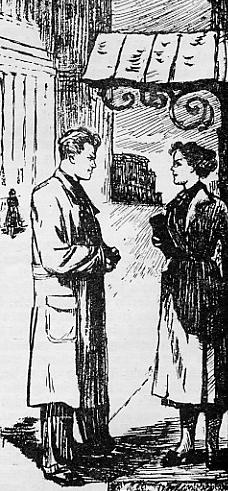 CHAPTER THIRTY-ONE
CHAPTER THIRTY-ONEAndrei attends the city conference of scientific and production workers. Andrei wonders at all the marvelous new advancements in science. He also discovers that there are thousands and thousands of other scientists who--just like Andrei--are battling against inertia and self-serving bureaucrats.
At the conference, city secretary Savin, the same one who had gotten Rheingold reinstated, makes a speech supporting innovation. He says "It is the duty of every Communist to support everything new, progressive, advanced." He also lashes out at the minor potentates who have gotten possession of some branches of science and try to crush anything new.
During a break between sessions, Savin speaks with Borisov, Dmitri, and Andrei. He decides he likes Andrei and asks bluntly what the city committee can do to help. But just then Andrei sees Marina in the crowd and he abruptly abandons Savin to chase after her.
Andrei has not been able to forget Marina since their meeting. After the conference, he walks her home. She is friendly, but doesn't seem "interested". Andrei is disappointed, but he does manage to get her phone number.
CHAPTER THIRTY-TWO
Lyubchenko at the Electro-Technical Institute whips out the condenser Andrei needs in just a few days. Andrei then gives an extremely orderly but rather plodding and timid engineer named Usoltsev the job of designing a new type of switch which he needs for the locator.
Usoltsev struggles for days, but can come up with nothing. He begs Andrei to relieve him of the task, saying that he'll gladly do donkey work but that inventing and creativity are beyond him. Most everyone in the lab upbraids Ulsoltsev for his lack of initiative. Borisov says:
|
|
Krivitsky says he remembers seeing a switch similar to the one needed in a shop somewhere. He then unearths a mostly dismantled device which has most of the switch remaining. Usoltsev eagerly takes to reverse-engineering this switch, working like a paleontologist reconstructing a dinosaur from a few bone fragments. Of course Ulsoltsev has to make changes and imagine what the missing parts are like. Becoming a little less orderly in the process, he finally produces the needed switch. Krivitsky then reveals that the switch he showed Usoltsev was just a dummy from some worthless old pre-war device. Usoltsev had in fact, all on his own, invented something new. Usoltsev is stunned with a new feeling of pride and accomplishment.
CHAPTER THIRTY-THREE
The model of the locator is almost complete. But they are having problems with interference. One day while watching a worker cut metal on a lathe, Andrei gets a sudden inspiration to use a winding, stretchable coil to eliminate distortions and interference.
Andrei is so overjoyed with his discovery that he goes to see Marina at the Board of Architecture where she works. (She is in charge of some large building project.)
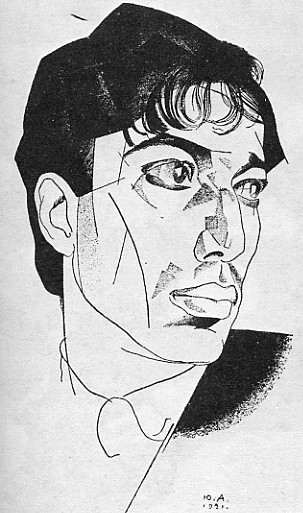 The Poetry of Boris Pasternak (in Russian) (in English) |
Marina thinks Andrei is pleasant enough, but a little wacky. Besides, she doesn't think he could be inspired by anything other than his electrical devices. Andrei asks her if she likes the poetry of Boris Pasternak.
CHAPTER THIRTY-FOUR
Andrei's team begins a seemingly endless series of laboratory tests on the locator. Novikov and Sasha grow tired of the tedious testing and get into a heated argument with Andrei about it. Even Borisov is growing impatient.
Andrei's walks with Marina become more frequent. But she still keeps him at arm's length and refuses to speak seriously with him. She continues her relationship with Vadim, even though she knows he lacks a responsive heart.
CHAPTER THIRTY-FIVE
One evening, Andrei bumps into Marina as she is strolling with Vadim. She invites Andrei to come along with them. Vadim waxes eloquently, bemoaning the fact that nowadays people can't see the beautiful colors of a sunset or the music of a babbling brook; nowadays, all people understand is the temperature of a white-hot chunk or iron or the pressure of a hydro-power station. Fed up with this pomposity, Andrei lets loose his own tirade. Poetry of colors? How many colors can Vadim distinguish? Twenty? A hundred? Well, Andrei can distinguish millions of colors with a spectroscope. Andrei continues:
|
|
Marina is impressed by this revelation of Andrei's soul.
CHAPTER THIRTY-SIX
At the next Party meeting, Andrei is criticized for his argument with Novikov and Sasha and it is suggested that he conclude his tests on the locator at the earliest possible time. Borisov knows that Andrei will eventually see that he was in the wrong, but Borisov didn't want to rush the matter with Andrei. "To do that might cripple Andrei's independence of thought, which, though sometimes intolerant and dangerous, was the main source of his strength."
CHAPTER THIRTY-SEVEN
Unable to endure his uncertain position with Marina any longer, Andrei calls on her and confesses his feelings. And--wouldn't you know it--she loves him, too. They kiss.
CHAPTER THIRTY-EIGHT
Viktor begins to feel that his position is getting shaky. He tries to get Maya to blame Andrei for her slow progress. But Maya, honest, refuses to do so.
To advance his career, Viktor decides that he needs to become chief engineer, so he starts making harsh criticisms of Dmitri.
Tonkov sends Viktor an article co-authored by himself and Grigoriev. In it, they say that Andrei's locator produced erroneous results in investigating an electric arc, whereas the results obtained by Tonkov's methods were precise.
Viktor goes to see the city Party secretary, Savin, supposedly to discuss some routine matters. Viktor notices that there is a book by Mikhail Prishvin on Savin's desk. Calculating, Viktor thinks that he should put a book like that on his desk as well, just to give a certain impression.
During the meeting, Viktor manages to launch some underhanded attacks on Dmitri and to show Savin Tonkov's article. Savin reads the parts about the locator then asks Viktor's opinion of Andrei. Viktor pretends to be conflicted because of his friendship with Andrei, but does his best to leave Savin with a negative impression of Andrei.
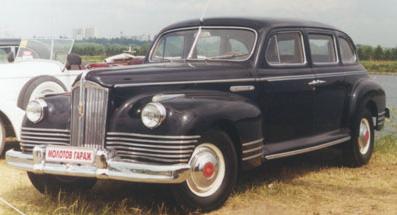 ZIS-110 Years of Production: 1946 - 1958. Based on: 1938 Packard 180. Engine: Six-liter, 8-cylinder. Power: 140 horsepower. Maximum speed: 87 MPH [140 KPH] Mileage: 10.2 miles per gallon Info provided by: SovAvto |
Savin calls in Andrei and shows him the Tonkov-Grigoriev article. Andrei doesn't understand why a competent, honest scientist such as Grigoriev would take part in this rubbish.
Savin says he will arrange for a public debate on the locator.
Savin then asks what Andrei thinks about the idea of Viktor being made chief engineer. Andrei pulls no punches, saying Viktor is a selfish, vain, careerist. Savin seems to agree, saying the problem is lack of political consciousness.
CHAPTER THIRTY-NINE
The next step in Viktor's master plan is to get elected to the factory Party committee. Dolgin is already on the committee, so together they come up with a plan to stage-manage the election meeting. They create a list of who should speak, who should nominate whom, etc.
During the meeting, Borisov, Maya, and other honest communist see what is going on. Dolgin ignores Borisov and others who try to speak, recognizing only those on his predetermined list. Brazenly, Borisov seizes the podium and demands honest elections. Dolgin tries to fight back, but he is forced to relinquish chairmanship of the meeting. Honesty prevails. Viktor's candidacy is rejected, but Borisov is elected.
CHAPTER FORTY
It is the day of the debate on the locator. In the morning, the lab receives a call saying that the electric line serving three apartment flats has broken. A perfect chance for an actual, in-field test.
Testers using the old method say the break is at 280 meters. The locator shows a large blip at 160 meters and a small one at 280 meters. What can this mean? Since the blip at 160 meters is larger, Andrei's team says that's where they should dig. While the digging commences, Andrei has to hurry to the House of Scientists for the debate.
The debate begins:
|
"Speaking one after the other, the Tonkovites treated the doubts of their predecessors as established facts: if the suppositions were dubious, the conclusions drawn from them must be wrong. They climbed on each other's shoulders, piling suspicion on the locator and extending their fire to [Andrei] himself. |
When Tonkov takes the podium, he accuses Andrei on philosophical grounds of diverging from the laws of Marxism-Leninism.
Andrei unrolls the diagram of his locator and challenges Tonkov to point out the flaws. Anachka, in the audience, gasps. In the tests for the article, the device in the diagram (Andrei's device) is the one which Tonkov claimed was his device. In other words, Tonkov was claiming Andrei's locator as his own. Maya stands up and declares that Tonkov's own invention proved worthless and was discarded. The audience is aghast at Tonkov's dirty, underhanded actions. Grigoriev (who had been duped by Tonkov into believing that Andrei's device was Tonkov's) denounces Tonkov.
An eminent older scientist, Timofei Yefimovich, one of the authors of GOELRO, rises to remind the audience of a caution once advanced by Lenin himself:
|
|
The night might have ended as a triumph for Andrei, but he gets a note from his team in the field: No break was discovered in the cable at 160 meters!
CHAPTER FORTY-ONE
Depressed by the apparent failure of the locator, Andrei returns to the site of the cable break, with Marina tagging alone. Andrei invites Maya to locate the break, and her method locates it to within 5 or 6 meters of accuracy. It is at the 281 meter mark. The break is repaired.
Before covering over the hole at the 160-meter mark, the foreman, Naumov, examines the cable. It is intact, but looks a little strange. Naumov suggests they cut the cable and examine it. When they do, they discover a tiny blot, where a small electrical leak has just begun. In two or three weeks, it would have grown and caused a complete breakdown! So the locator had been right! It had registered blips at both 160 and 280 meters. The one at 160 was larger because it was nearer; but both points were indicated. The locator locates not only actual breaks, but future breaks as well! A real triumph!
Andrei invites everyone over to his place for drinks. In the early morning hours, the team members congratulate themselves and plan future improvements.
Andrei kisses Marina and declares to everyone that she is his wife!
